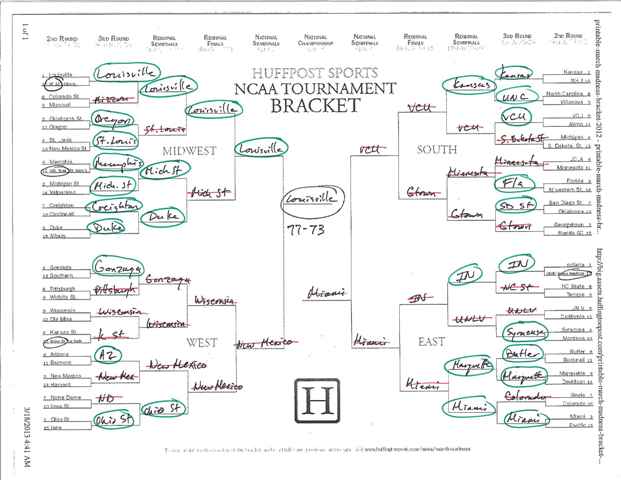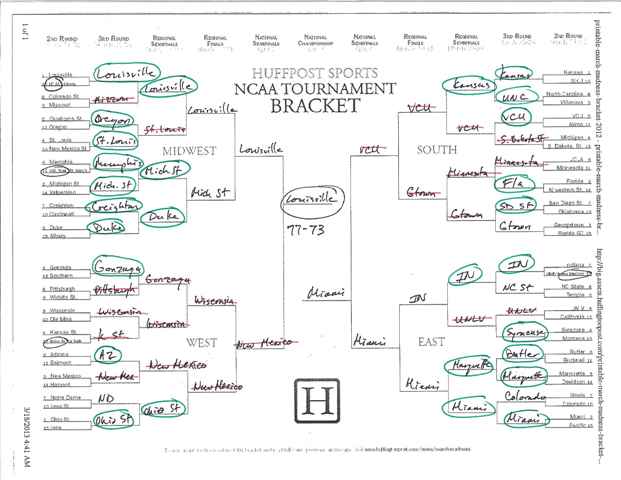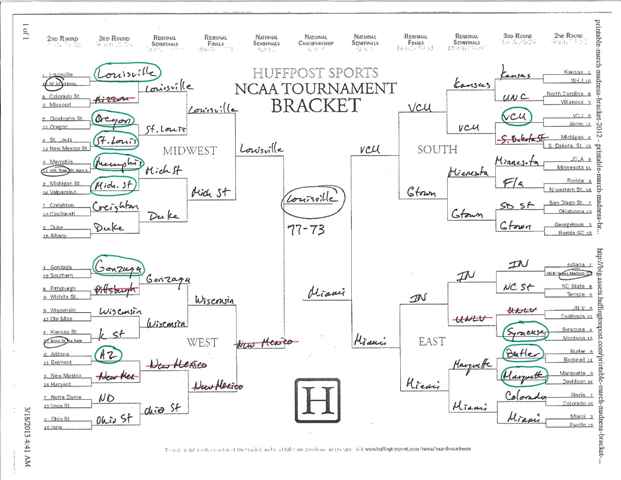Bruce and Dan discuss the top issues of the day.
Bruce and Dan discuss the top issues of the day.
Bruce and Dan talk back and forth.
Dan Chit Chat with the lobotomy line on sports.
Hawaii was my mom’s favorite place on the planet.
When I was in college, I promised my mom I would buy her a condo in Hawaii by the time I was 30 years old.
At the time I had visions of being a young hot shot making a lot of money. But after I decided to go into politics, much to her taciturn chagrin, my mom told me to forget the Hawaiian condo because she feared that the only way I could afford such a luxury working in government is if I was doing things that would land me in federal prison.
So far I’ve kept the “don’t go to federal prison” promise.
My mom was my greatest teacher and biggest cheerleader.
I lost both yesterday afternoon when she passed away suddenly.
While I believe that in death my mom has achieved everlasting life, the transitional event is a nasty business. My mom was the antithesis of nasty. And so I prefer to reflect upon the life I knew of the lovely, refined woman who raised me rather than the one I cannot know.
We are tasked to live in the present. It usually takes a loved one’s death to flash forward a lifetime’s worth of memories.
As I think about my lifetime of memories of my mom and all the school lunches she made, all the basketball games she attended, and all of the whining she endured, a theme emerges: homemaker.
My mom was a homemaker in the literal sense of that word: making a home, which is to say a place of love, safety and work.
Home is where you do your homework, help your father in the garage, clean out the cat’s litter box, practice your jump shot in the driveway, play whiffle ball with friends in the backyard, sit down to dinner with your family and say your prayers before bed.
My mom and dad adopted me when I was three days old. I don’t know what my life would have been like without my mom. I just know it wouldn’t have been as good.
But I was just one of many strays my mom took in. She let me pay the family sensibility forward when I persuaded her to adopt a neighbor’s cat.
My mom was the lady in our neighborhood who put saucers of milk and bowls of food out for the full range of suburban wildlife. Our porch should have been sponsored by Mutual of Omaha.
My mom explained Shakespeare and introduced me to the fantastical worlds borne from the mind of CS Lewis. She bequeathed to me her love of reading.
My mom taught me to be responsible for myself and respectful of others. She insisted I be a half an hour early for everything so as to be considerate of other people’s time. As it pertains to punctuality, she missed her calling in the US Armed Forces.
All my mom wanted in return was for her two children to be happy and successful on their own terms, 20% off at Nordstrom and for the Cubs to win a World Series.
She raised two successful children. She loved shopping at Nordstrom. As for the Cubs, my mom also taught me that some things are not meant to be.
In lieu of flowers, please consider being a homemaker of your own by: taking in a stray from ADOPT Naperville http://www.adoptpetshelter.org/; providing children in need with new books to spark their love of learning athttp://www.firstbook.org/; and, while you’re doing some good for others, treat yourself to a bauble of some sort at Nordstrom. My mom deserved it. So do you.
As for my mom, I hope Heaven is nicer than Hawaii.
Eli and Engelman and Daniel Daniel Cajigas, co-founders of iStockAlerts, have created an application that will make it easier for the novice to trade stocks. Check out their promo video:
Listen to the segment here.
Watch their appearance here.
Thank you to Wayne and Laura Sikorcin for stopping by the studio this morning to show us their brilliant product for easily making water balloons. Catch Shark Tank tonight on ABC at 7 pm. CST.
…with the lobotomy line on sports.
Bruce’s Bracket (he’s still in the lead but can’t score anymore; 61 points)

Dan’s Bracket (he can win if Louisville wins the National Semi-Final game; 49 points, projected 97)

Bruce’s Bracket (he’s still in the lead through the first three rounds; 41 points, projected 161)

Dan’s Bracket (he needs big wins in the East and Midwest regions to catch up with Bruce; 37 points, projected 133)

Bruce’s Bracket (he’s in good shape after Day 1; 12 points, projected 126)

Dan’s Bracket (he’s in some trouble after losing New Mexico; 11 points, projected 111)

Don't kid yourself — 1 hour won't save world
March 27, 2008
By Dan Proft, a Redeye special contributor
http://articles.chicagotribune.com/2008-03-27/news/0803270410_1_earth-hour-live-earth-earth-day
Earth Day. Live Earth. And, now, Earth Hour.
The latest bright idea from the country that gave us "Crocodile Dundee" is to have everyone across the globe turn off their lights for an hour at 8 p.m. Saturday.
Apparently, a bunch of neo-Luddites in Sydney did this last year and it made them feel good about themselves, so they've decided to give the rest of the world a chance to achieve a similar sense of self-worth.
Because, if we are being honest, Earth Hour, like its forefathers, is not about environmental policy — it is about social networking and self-importance.
Earth Hour is for those consumed with monitoring their carbon footprint and confused about why they do it.
The desire to be relevant and to have a positive impact on the world is a good instinct. But it's lost in the self-involved nature of exercises like Earth Hour.
The Gandhian ideal "to be the change you wish to see in the world" requires thoughtful, measured action toward an end bigger than one's self.
Earth Hour, by contrast, smacks of desperation for self-actualization.
Rather than creating a platform for compelling, fact-intensive arguments about eco-threats or creative ideas for green energy, Earth Hour is another in an endless series of symbolic events that define intergalactic participation in "something" as an end in itself.
I understand that there are those who believe that rapture is upon us because, over the past 100 years, the temperature on Earth has gone up a little less than 1 degree Fahrenheit.
That, some may argue, is the higher calling to which Earth Hour is responding.
But, even accepting the premise, is the Earth Hour response on point?
Energy consumption is the problem. Turn off your lights for an hour is the answer. Really?
Maybe for a household in the short term, but for nations in the long term? Along this line of logic, I should counteract America's dependence on foreign oil by riding my bicycle to work — but just for one day?
The reality is that we do not want to live in the dark and we do not want to take a date out on our Razor Scooter.
Viable eco-friendly policies will not come at the expense of our quality of life and the mobility we currently enjoy.
The other reality is that the impact of Earth Hour and these other faux call-to-arms events is negligible, if not outright counterproductive, relative to actual conservation or even to advancing a particular remedy.
That's why the explicit mission of these events is routinely the cleverly nebulous and unquantifiable raising of "awareness."
Think about Al Gore doing his excruciatingly awkward hipster routine with Leonardo (or "Leo" as he calls him) DiCaprio at his Live Earth concert last July.
How much wattage was required and how many metric tons of garbage were created so Kelly Clarkson could screech on about her man troubles? That was conservation? That was a global wake-up call?
No, it was a platform for self-congratulatory celebrities and a few bloated politicians to "raise awareness" of their deep-seeded sense of social responsibility prior to taking off in their Escalades and Lear jets.
Fast forward to Saturday.
You are sitting in the dark hoping CBS will re-run the episode of "How I Met Your Mother" you are missing (be sure to turn that TiVo off). You are thinking about what you're going to do with that cool $1.20 you're saving off of your ComEd bill this month.
And, wait, what was the point of this again?
No one is for capricious destruction of the environment. Truly being "green," however, demands more than annual self-esteem boosters.
by Dan Proft
Responding to the news that the Securities and Exchange Commission (SEC) had confirmed what Illinois residents know to be true which is that their state government is organized as a conspiracy to defraud them, House Speaker Mike Madigan said, the SEC won’t let me be or let me be me so let me see…it’s Blagojevich’s fault.
The original Slim Shady actually said, “There are no victims here. Nobody’s lost any money.”
$2.2 billion worth of municipal bonds sold under false pretenses between the years 2005-2009, according to the SEC, but, according to the most powerful man in Illinois politics, there’s nothing to see here.
Others disagree.
George S. Canellos, Acting Director of the SEC’s Division of Enforcement, said, “Time after time, Illinois failed to inform its bond investors about the risk to its financial condition posed by the structural underfunding of its pension system.”
Elaine Greenberg, Chief of the SEC’s Municipal Securities and Public Pensions Unit, added, “Regardless of the funding methodology they choose, municipal issuers must provide accurate and complete pension disclosures including the effects of material changes to their pension plans.”
Rich Miller, publisher of the Capitol Fax newsletter, correctly observed, “Fraud is fraud, and bond buyers could’ve received a higher interest rate had it not been for that fraud. So, yes, there were some victims.”
One does not need a Series 7 license to recognize that when a private sector operator commits securities fraud it is quite a serious matter. There are a number of corporate executives playing catch with Red in the prison yard who wish they could live in Mike Madigan’s world without consequences when it comes to obeying the law and stewarding other people’s money.
Anyone surprised by Mike Madigan’s care-free attitude should not be. What, is his Attorney General daughter going to investigate and pursue enforcement of state securities laws?
Expect Lisa Madigan to exercise precisely the same vigor in this specific instance as she has offered in pursuing public corruption generally during her whisper-quiet decade as Illinois’ chief law enforcement official.
Mike Madigan figured out long ago that command control of state government means never having to say you’re sorry.
And so his offense pile up.
A 2011 Crain’s investigation found that Madigan “cost taxpayers nearly half-a-billion dollars by blocking repeated efforts to restructure McCormick Place bonds and finance a much-needed second hotel at the convention center.”
From 2005-2010, as the state was defrauding municipal bond investors with false information, Mike Madigan stopped five McCormick Place refinancing bills in Springfield, ignoring declining interest rates that would have saved Illinois taxpayers hundreds of millions of dollars in interest payments.
Illinois announced on April 2 it will return to the municipal bond market to sell $800 million of tax-exempt and taxable general interest bonds.
Caveat emptor.
In his budget address in Springfield on Wednesday, Governor Pat Quinn mainly sought to solidify his alibi for the financial catastrophe that is Illinois as he referenced fictional plaudits from George Will to buttress the fictional work of cartoon character and Quinn point-man on pension reform, Squeezy the Pension Python.
The only thing missing from Quinn’s mystical world of make-believe is Manti Te’o’s girlfriend. What’s one more ghost payroller after all?
Quinn cited George Will’s alleged support for Quinn’s modest 2010 pension reform measure saying, “National conservative columnist George Will called that law an ‘earthquake,’ a ‘seismic event’.”
What George Will actually wrote was, “If an earthquake occurs in Illinois and no one notices, is it really a seismic event? Gov. Pat Quinn called it a ‘political earthquake’ when the state's Legislature recently voted…to reform pensions for state employees.”
George Will described Quinn’s characterization of his own legislation and left that characterization as an open question.
But, again, distinctions between fact and fancy are not the forte of the Quinn administration.
I have another open question, if the 2010 pension reform Quinn touted was the “earthquake” he alleged it to be, why did he devote the preponderance of his budget address to pleading with the General Assembly to act on more substantial pension reform?
Another Chicago Democrat whose seismic event turns out to be a tremor for Illinois taxpayers.
One of the places where the ground is actually crumbling under our collective feet is with the state’s Medicaid program, our largest general fund expenditure. Currently providing health care services (in theory) to nearly 1 in 5 Illinoisans, under Quinn’s fast-tracking of Obamacare implementation, that number is expected to grow to 1 in 3 Illinoisans.
Illinois’ Medicaid program in its current iteration works like this: The state cannot finance its health care promises to the current Medicaid enrollees so it does not pay health care providers. Health care providers in turn stop serving Medicaid recipients because the state does not pay. Thus, the very people who should be served by the program—indigent persons, pregnant women, the developmentally disabled—have actually seen their access to quality health care deteriorate.
The Quinn solution? Add another 1 million people to the Medicaid rolls so as to present the appearance of compassion while in fact using the most vulnerable among us as cannon fodder for the big government agenda of Chicago Democrats in Springfield and Washington, D.C.
Another pillar of government cracking under the weight of command control is K-12 education. Quinn focused on preserving the state’s financing of early childhood education saying, “A child is only four years old once.”
As I understand it, a child is only seven, eight, and nine years old once as well. What I do not understand is how the governor can justify turning a blind eye to children left to rot in schools in Chicago and throughout Illinois that will fail them just as they have failed generations before them. What I cannot understand is a General Assembly that aids and abets discrimination against children, predominately minority children, based on their address and household income. So those four year olds Quinn referenced will start school earlier and then be funneled into school systems that will not have taught them to read by the fourth grade. This is what the governor and the Springfield ruling elites call “a top priority”. Theirs is an urgent commitment to failure.
Quinn concluded his address with another sop to pop culture play-acting invoking Daniel Day Lewis’ portrayal of Abraham Lincoln saying, “And so I ask you…as our greatest president Abraham Lincoln asked in this year’s film: ‘Shall we stop this bleeding?’”
Quinn was asking the General Assembly. I know what their answer is. The question is better put to the Illinois electorate next year. And that is another open question.
By Dan Proft
Winston Churchill reportedly said of Clement Attlee, the man he both preceded and succeeded as Prime Minister, that Attlee was “a sheep in sheep’s clothing.”
I write here not to review British political history but to wonder aloud what Churchill would say about the dithering of inconsequential men in the face of crisis today. That rumination inevitably leads me to Governor Pat Quinn’s State of the State Address in Springfield on Wednesday.
Quinn created the cartoon character Squeezy the Pension Python to explain the depths of the fiscal abyss that is the state’s public sector pension system to low information voters like the members of the General Assembly.
Squeezy has been such a hit that Quinn enlisted Barney to write a kindergarten-friendly State of the State Address about a fantastical world called “Our Illinois”.
In Our Illinois, “we leave no worker behind,” according to Quinn. Back in Actual Illinois, this news must have come as quite a surprise to the 9% of Illinoisans (truly more like 15%) who are unemployed.
In Our Illinois, “small business means big business,” said Quinn and therefore, “Driving economic growth for small businesses requires doing all we can to make sure government is not in the way.” Back in Actual Illinois, small businesses are paying the fourth-highest combined national-local corporate tax in the industrialized world. In Actual Illinois, the only way to get state government to ignore your business is if you’re sitting on stacks of unpaid invoices for services rendered to state agencies.
In Our Illinois, Quinn has “signed into law education reforms that put the students of Illinois first.” Back in Actual Illinois, two-thirds of fourth graders are not grade-level proficient in reading or math to say nothing of student performance in Actual Chicago.
Our Illinois is corruption-free zone of Burkean representative democracy because Quinn “passed a strong ethics code for office holders and public employees.” Back in Actual Illinois, Quinn’s two-time gubernatorial running mate, a man Quinn described as “a person who’s honest and one of integrity,” is doing a 14-year stretch in a federal prison in Colorado and three state legislators have been arrested since the codification of that “strong ethics code” of which Quinn spoke.
If only the woozy dreamland that is Our Illinois was distinguishable from Actual Illinois perhaps the nearly one million individuals who have fled Illinois over the past 15 years for friendlier confines would have simply populated Pat Quinn’s state of delusion instead.
But as long as Actual Illinois is populated by flocks of voters who behave like “sheep in sheep’s clothing” Pat Quinn is our shepherd.
By Dan Proft
Bruce and Dan had actor/comedian Paul Reiser on the show Friday.
By Dan Proft
-I learned that the only group more tolerant of consistently poor performance than the front offices of the Chicago Cubs and Chicago Bears is the Illinois electorate.
-I learned that Pat Quinn and his sidekick Squeezy the Pension Python should be hosting a Saturday morning children’s show not overseeing the 20th largest economy in the world
-I learned that federal indictments are Illinois’ version of term limits.
-I learned that Chicago Teachers’ Union President Karen Lewis has an insatiable appetite—for other people’s money.
-Though I desired to watch the Chick-fil-A Bowl game between LSU and Clemson on New Year’s Eve, I remembered that I learned from Mayor Tiny Dancer that the bowl sponsor does not represent “Chicago values”.
-I learned that the right to carry, the right to work, the right to keep what you earn and the right to equal treatment before the law are not as popular in Illinois as in the other 49 states.
-I learned from Toni Preckwinkle and Rahm Emanuel that if you speak in complete sentences you can fool most people into thinking that you are actually conducting business differently from those who preceded you.
-I learned it has become axiomatic that whatever the worst possible outcome is for the Illinois Republican Party that is precisely what will happen.
-I learned from Sen. Dick Durbin that you can get away with making completely unreasonable and untrue statements if you do so in a reasonable tone of voice.
-I learned that the 800,000 people who have exited Illinois during the last 15 years were ahead of the learning curve.
-I learned about psychological disorders whose proximate cause is politics. President Obama diagnosed Mitt Romney’s penchant for flip-flopping on issues as “Romnesia”. In Chicago, voters suffer from the debilitating affliction of "Rahmnesia" the leading indicator of which is the inability of a voter to recall what has happened to them under Chicago Democrat rule when they enter a voting booth. And Congressman Jesse Jackson Jr. was stricken with “feditis” also known as “G-flu”, a malady that left him curiously able to conduct his private affairs, remodel his home and buy expensive time pieces, but not carry out his public duties.
-I learned that Illinois still isn’t broken. It is still fixed.
Santa stopped by the 89 WLS studio to visit Bruce and Dan. While here, he took calls/emails/texts from listeners, noting what they want for Christmas.